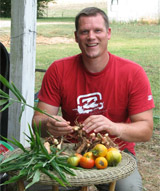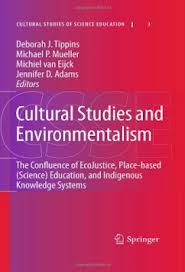Ecojustice research supports place-based science education
by Ted Kincaid |
 Mike Mueller just got here, but he has big plans. With his rich background in ecojustice
research, he's ready to apply that knowledge to place-based science education in Alaska.
Mike Mueller just got here, but he has big plans. With his rich background in ecojustice
research, he's ready to apply that knowledge to place-based science education in Alaska.
What is ecojustice, you ask?
"It's this holistic tension between cultural systems and natural habitats," says Mueller, a new associate professor of secondary education in UAA's College of Education. Recently transplanted from the University of Georgia, Mueller has been focusing his research on ecojustice for about eight years and he is now a part of a team at UAA seeking funding to better connect science education with identity of place for Alaska's young students.
"Ecojustice looks at the sustainability of both the needs of people and the needs of animals and their natural systems," Mueller says. "In my research I mostly look at trends that are emerging in science education, and gather evidence that these are rapidly emerging or cutting-edge trends."
One example of such a trend is citizen science. Given the increasing public participation in science, Mueller asks, "How do you engage students in evaluating justice issues or issues around fairness in their own environments and lives?"
Citizen science helps connect people to their surroundings through research projects that allow them to monitor and collect data on issues pertinent to their own communities. Why not translate that into science education in public schools? When Mueller first started writing about citizen science five years ago, he estimates there were maybe a hundred projects worldwide that people could get involved in. Now that number is well over 500 worldwide. "It's a really neat trend," he says.
More importantly, maybe, is if you follow citizen science far enough, especially in
an education setting, it could turn in to youth activism-another area that Mueller
is passionate about.
"How do you get kids to take this science content knowledge that they're learning,
and obviously being tested on-how do you take it to the next step to where they start
forecasting and considering consequences. From there they can take action in their
community, be a part of the decision-making as stakeholders in their own community,"
he says.
Mueller was in law enforcement with the U.S. Coast Guard for several years before stepping into academia. Being in and around the marine environment turned him on to earth science-things like ocean currents, waterways and geology. It was enough to inspire him to pursue a post-baccalaureate teaching certification (2001) in earth and space science and then a master's in curriculum and instruction (2004), both from Ottawa University in Phoenix, Arizona. He was deployed to Los Angeles during Iraqi Freedom for almost a year in 2002, but otherwise taught elementary and high school for three years. Over that time, he noticed a big problem.
 "I got really frustrated at the standards movement and how it was killing the way
a lot of science teachers were teaching. They started teaching to the standardized
test; the test became everything and it really decontextualized a lot of what I consider
good learning."
"I got really frustrated at the standards movement and how it was killing the way
a lot of science teachers were teaching. They started teaching to the standardized
test; the test became everything and it really decontextualized a lot of what I consider
good learning."
So he decided to move into higher education to confront that movement through science education policy. That led Mueller to earning his doctorate in science education and cultural studies from the University of Tennessee in 2007.
"What I really want to do is make science education more holistic," he says. "Have it be taught with place in mind, with people in mind and with the importance of environment in mind."
Alaska, then, was a natural fit for Mueller. Alaska is known for having a place-based focus in many areas. Mueller is ready to harness that.
His first major assignment: an interdisciplinary grant proposal on behalf of the College of Education and College of Arts & Sciences (CAS) for Math and Science Partnership (MSP) funds from the National Science Foundation-a potentially multi-million dollar award that could result in new faculty, post-doctorate student and graduate student positions. Mueller has been collaborating with lead principal investigator Douglas Causey, Ph.D., from CAS's Department of Biological Sciences, to design an MSP project at UAA that would focus on creating local research-intensive experiences for teachers in Kodiak Island Borough School District to participate in citizen science, integrate locally based issues into their teaching, and then engage students in these skills and knowledge.
"The whole idea of the MSP is really predicated on this idea that kids need to start taking responsibility for the environments in their communities," Mueller says. "What I hope comes out of this is youth activism. To start with, we are anticipating that Kodiak youth will be involved in sharing their environmental monitoring data with others across the state of Alaska."
The MSP proposal will be delivered to the National Science Foundation in December. In the meantime, Alaskans can bone up on the issues in Mueller's most recent publication: "Cultural Studies and Environmentalism: The Confluence of EcoJustice, Place-based (Science) Education, and Indigenous Knowledge Systems." And stay tuned for his next title, in press now and available August 2013, "Assessing Schools for Generation R (Responsibility): A Guide to Legislation and School Policy in Science Education."
"'Assessing Schools for Generation R' is a new policy book that is anticipated to inform the next 20 years of science education," Mueller says. "There was a New York Times reporter who coined the term 'Generation R' as the generation of recession, but a lot of people are talking about responsibility now. So I brought a group of about 50 nationally recognized scholars from around the nation together to write this new policy book for President Obama and [U.S. Secretary of Education] Arne Duncan."
He says the crux of the book is to answer the question of how to measure schools more holistically, well beyond standardized tests and taking into consideration how schools (and students) are impacting their communities, both economically and socially.
Two additional titles he is currently working on with colleagues that will be available in the general trade market are "EcoJustice, Citizen Science, and Youth Activism" and "Developing Environmental Awareness in Children: A Nature Studies Guide for Parents and Educators."
Mueller is one to watch as UAA continues to educate our state's educators. And UAA is one to watch as these two colleges work together for a common cause-authentic, place-based science education in Alaska.
 "Ecojustice research supports place-based science education" is licensed under a Creative Commons Attribution-NonCommercial 4.0 International License.
"Ecojustice research supports place-based science education" is licensed under a Creative Commons Attribution-NonCommercial 4.0 International License.









